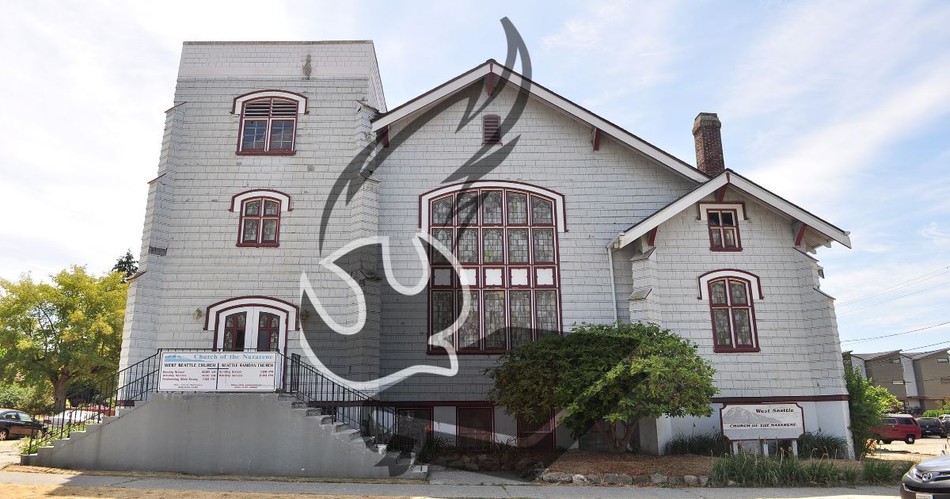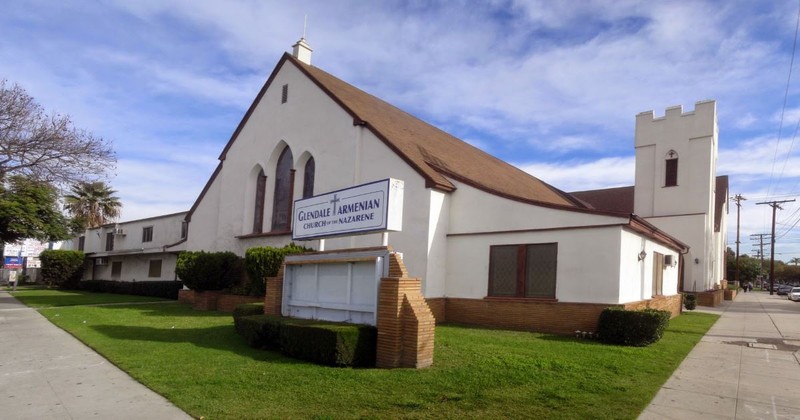

The Church of the Nazarene, with its members commonly referred to as Nazarenes, is the largest Wesleyan-holiness denomination in the world. Having origins from the Holiness Movement, Nazarenes hold a global mission to “go and make disciples of all nations.”
Discover 10 things to know about the history and beliefs of this renowned denomination!

The Church of the Nazarene is the result of a set of consolidations that transpired between multiple holiness churches, organizations, and denominations throughout the 20th century. The most notable of these alliances took place at the First and Second General Assemblies, held at Chicago, Illinois, and Pilot Point, Texas in 1907 and 1908, respectively. The principal coordinator of these initial mergers was C. W. Ruth. The primary founder of the Church of the Nazarene was Phineas F. Bresee who was also the founding president of Point Loma Nazarene University.
The history of the Church of the Nazarene has been classified into seven coinciding periods by the organization of the Nazarene archives in Lenexa, Kansas: (1) Parent Denominations (1887–1907); (2) Consolidation (1896–1915); (3) Search for Solid Foundations (1911–1928); (4) Persistence Amid Adversity (1928–1945); (5) Mid-Century Crusade for Souls (1945–1960); (6) Toward the Post-War Evangelical Mainstream (1960–1980); and (7) Internationalization (since 1980).

The global mission of the Church of the Nazarene since its origins has been "to respond to the Great Commission of Christ to 'go and make disciples of all nations' (Matthew 28:19)".
In December 2006, this was stated more briefly as "to make Christlike disciples in the nations". This phrase outlines the global mission of the denomination.
In 2009 the General Assembly designated in its revision of Article XI of the Manual the modes for achieving its mission: "making disciples through evangelism, education, showing compassion, working for justice, and bearing witness to the kingdom of God."
Since 2001, the three "core values" of the Church have been recognized as "Christian, Holiness, Missional". The denominational ideal is: "to be a disciple-making church, an international community of faith, in the Wesleyan-Holiness tradition."

At the 2013 General Assembly, the Board of General Superintendents declared seven characteristics for the Church of the Nazarene:
1. Meaningful Worship
2. Theological Coherence
3. Passionate Evangelism
4. Intentional Discipleship
5. Church Development
6. Transformational Leadership
7. Purposeful Compassion
The Board of General Superintendents declared: "While these descriptors do not take the place of our mission 'to make Christlike disciples in the nations' or our core values of 'Christian, holiness and missional,' they describe what we believe should characterize every Church of the Nazarene and in large part, should be reflected by Nazarenes everywhere."

Sanctioned by the General Assembly, "the supreme doctrine-formulating and lawmaking body of the Church of the Nazarene", the 2013–2017 publication of the Manual is "the official statement of the faith and practice of the church" and "is, therefore, authoritative as a guide for action". Exhibiting the conclusions and assessments of clerical delegates of the Twenty-eighth General Assembly, which met in Indianapolis in 2013.
The 2013–2017 Manual covers a concise historical description of the denomination; its Constitution, which defines its 16 Articles of Faith, its understanding of the church, the Covenant of Christian Character for holy living, and principles of organization and government; the Covenant of Christian Conduct, which address key issues of contemporary society; and policies of church government dealing with the local, district, and general church organization.
Photo Above: General Assembly and Conventions of the Church of the Nazarene (2005) Wikipedia

The Church of the Nazarene holds in the Arminian tradition of free grace for all and human autonomy to choose to participate in that saving grace. The Nazarene Church differentiates itself from many other Protestant churches because of its view that God's Holy Spirit enables Christians to be continually obedient to Him—alike to the belief of other churches in the Evangelical Holiness movement.
The Nazarene Church does not believe that a Christian is necessarily susceptible to sin every day. Rather, the Nazarene Church teaches that sin should be the very rare exception in the life of a devoted Christian. Also, Nazarenes believe in complete sanctification, the view that a person can have a relationship of whole devotion to God in which they are no further influenced by original sin. Meaning through the power of the Holy Spirit, humans can develop to be able to live a holy life for the glory of God. The idea of entire sanctification arises from John Wesley's concept of spiritual perfection. This is represented on a variety of different levels; as with any denomination, certain followers interpret the belief more rigorously than others.

The denomination inherited its modern title from one of its original predecessor groups, the California based "Church of the Nazarene" established in October 1895 by Dr. Phineas F. Bresee and Dr. Joseph Pomeroy Widney. The name of the denomination comes from the biblical description of Jesus Christ, who had been raised in the town of Nazareth (and was considered therefore as "a Nazarene"). Jesus is called a Nazarene in Matthew 2:23, and in Acts 24:5, where Tertullus describes him as "a ringleader of the sect of the Nazarenes."
From this biblical reference, the denominational name centers upon Jesus as "The Nazarene". Furthermore, the disciples of Jesus were originally called "Nazarenes" (Acts 24:5), a phrase perhaps used by Jesus himself. According to Church of the Nazarene archivist Dr. Stan Ingersol:
The Hebrew name for "Jesus," derived from "Joshua," was common in first-century Palestinian Judaism, so "Jesus of Nazareth" specified which Jesus, and Acts references the early Palestinian Christians as followers "of the Nazarene" and "the sect of the Nazarenes." The term "Christian" developed outside Palestine, in Syria according to Acts, in conjunction with the mission to the Gentiles. It is derived from "Christos," a Greek translation of the Hebrew "messiah" or "anointed one." As Gentile Christianity spread through the Mediterranean basin, Jesus became known as Christ and references to "the Nazarene" diminished. Nineteenth and early 20th century European writers produced numerous biographies of Jesus, re-popularizing the term "Nazarene" and setting the stage for how the Church of the Nazarene received its name.
Referenced: Archives' Answers: The denomination's name Nazarene Communications Network.

During its history, the Church of the Nazarene has sustained a stance advocating total abstinence from alcohol and any other intoxicant, including cigarettes.
Original Nazarene founder Bresee was engaged in the Prohibition movement. Although this proceeds to be discussed, the position remains in the church. While the church does not view alcohol itself to be the cause of sin, it acknowledges that intoxication and the like are a 'danger' to many people, both physically and spiritually.
Historically, the Nazarene Church was founded in efforts to benefit the poor. Alcohol, gambling and the like, and their addictions were mentioned as things that kept people poor so Nazarenes have traditionally refrained from those things. Furthermore, they believe a person who is meant to serve an example to others should withdraw the use of them, in order not to cause others to deviate from their 'walk with God,' as that is regarded a sin for both people.

The Church of the Nazarene primarily practices two sacraments: Christian baptism and the Lord's Supper, or communion.
Every Nazarene church is expected to practice the sacrament of the Lord's Supper at least four times a year. The 2009–2013 Manual encourages pastors to increase the regularity of the Lord's Supper, which some congregations celebrate monthly or even weekly.
Nazarenes allow both believer's baptism and infant baptism. When a family in the Church of the Nazarene chooses not to baptize their infants they oftentimes partake in an infant dedication. Whether a child is baptized or dedicated is the decision of the parents of the child. This choice is often influenced by geographic location, local church culture, and their pastor's doctrinal positions, and if they were baptized or dedicated as a child.

Local - The essential unit of organization in the Church of the Nazarene is the local church congregation, which may be either an assembled church or church-type mission (oftentimes known as "New Starts"). At the end of September 2014, there were 21,425 organized churches and 7,970 church-type missions, for a total of 29,395 congregations.
District - Local congregations are arranged administratively into geographical Districts. At the 2009 General Assembly, a declaration was passed defining a district as "an entity made up of interdependent local churches organized to facilitate the mission of each local church through mutual support, and sharing of resources, and collaboration." Each district is directed by a District Superintendent, who is normally elected by delegates from each local church in an annual gathering called the District Assembly.
Region - All Districts of the Church of the Nazarene are organized into Regions. As of September 2014, there were:
Africa (611,398 members), in 8,686 churches in 130 districts.
Asia-Pacific (119,349 members in 1,894 churches in 46 districts.
Eurasia (240,585 members in 7,832 churches in 52 districts.
Mesoamerica (which combines the former Caribbean and Mexico & Central America regions) (364,368 members in 3,133 churches in 77 districts.
South America (279,408 members in 2,603 churches in 80 districts.
USA/Canada, which comprises the USA, Canada, and Bermuda, has 649,998 members in 5,247 churches in 80 districts and has 11 Nazarene universities and colleges, and also Nazarene Theological Seminary in Kansas City, Missouri.
The regions are managed through Nazarene Global Mission, an institution formed in 2011 after an important restructuring that combines all purposes of the former World Mission Department. It centers on cooperation to better provide Nazarene churches support at the local, district, regional and international levels.

The 2013–2017 Manual of the Church of the Nazarene declares that "[t]he Church of the Nazarene, from its inception, has been committed to higher education. The church provides the college/university with students, administrative and faculty leadership, and financial and spiritual support . The church college/university, while not a local congregation, is an integral part of the church; it is an expression of the church."
A portion of each local church and district budget is allotted for Nazarene higher education, which supports the cost of each educational zone or nation's respective school.
In 2016, the Church of the Nazarene owned and administered 52 educational institutions in 35 countries on six continents, including 5 graduate seminaries; 31 undergraduate theological colleges; 2 nurses training colleges in Swaziland and Papua New Guinea, and 1 teacher training college in Papua New Guinea. Global student enrollment for Nazarene schools in 2016 totaled 51,555.
Church of the Nazarene | Wikipedia.org
Manual | Church of the Nazarene | Nazarene.org
This article is part of our Denomination Series listing historical facts and theological information about different factions within and from the Christian religion. We provide these articles to help you understand the distinctions between denominations including origin, leadership, doctrine, and beliefs. Explore the various characteristics of different denominations from our list below!